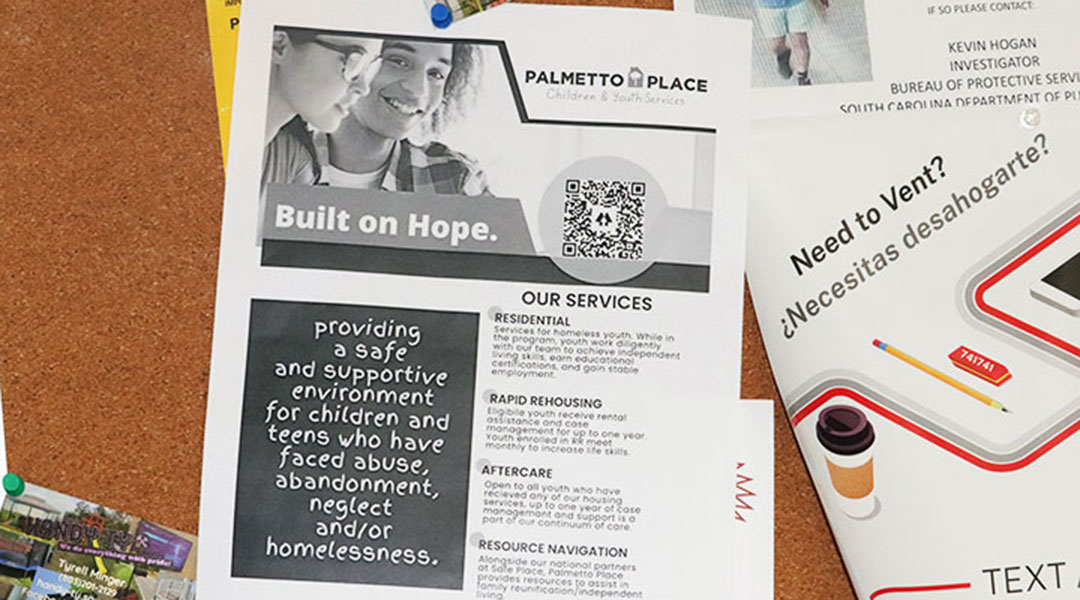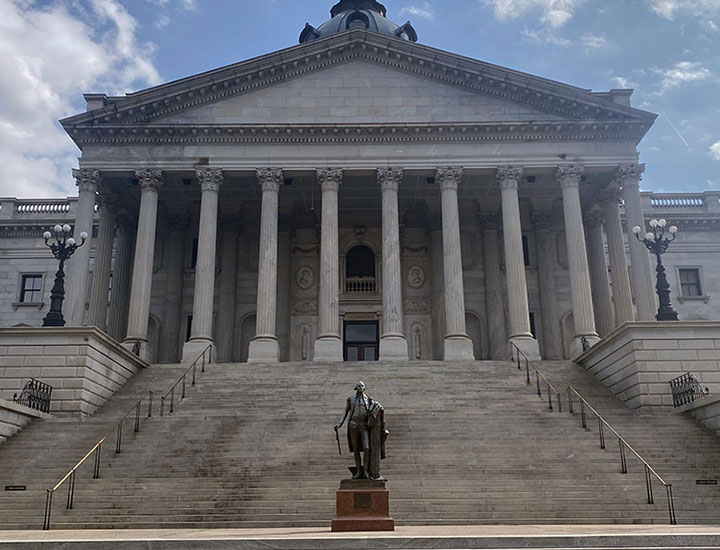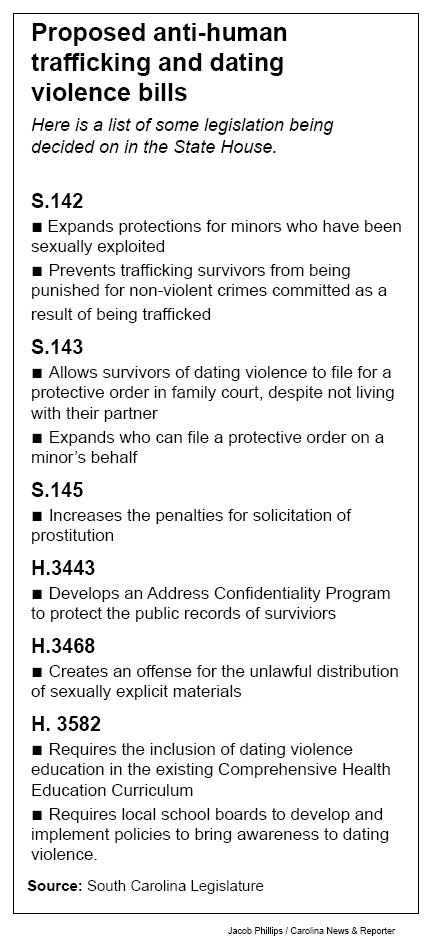Flyers, such as this one from Palmetto Place, are hung around various locations to help raise awareness to human trafficking and dating violence. (Photos by Jacob Phillips)
Survivors of human trafficking and dating violence may feel more protected in South Carolina as bills aimed at supporting victims and punishing traffickers make their way through the Legislature.
Three bills made it out of committee last week and are expected to pass the Senate but could face an uphill battle in the House.
“I passed these same bills last year and they stalled out in the House,” state Sen. Katrina Shealy, R-Lexington, said. “There’s a group of people over there that think that men should be able to do what they want to do.”
Human trafficking and dating violence are separate issues. But there can also be major overlap. Victims of dating violence are often prime targets for traffickers.
“Traffickers prey on people’s vulnerabilities,” said Lisa Kejr, the COO of the anti-human trafficking organization Lighthouse for Life. “Whether it’s complications in a family, a single-parent home, looking for a job, lonely and depressed, upset about politics, whatever it is.”
Advocates have said these bills come at a much-needed time.
The domestic violence crisis line received 18,000 phone calls in 2021, according to a report from the S.C. Coalition Against Domestic Violence and Sexual Assault. The report also found 42.3% of women and 29.2% of men in the state experience some form of physical violence from a partner.
The S.C. Human Trafficking Task Force also has seen an increased number of calls to its human trafficking hotline over the years, it said in a recent report.
It’s unclear if this means there is an uptick in cases of human trafficking or just more reported cases.
“We don’t know if that’s because just more awareness of the hotline number or more awareness of trafficking,” said Jennifer Manson, Richland county’s representative on the state’s task force. “Maybe our efforts to bring awareness to the community are working. It’s kind of hard to tell.”
Advocates think the bills are important and long overdue.
Polaris, a national anti-human trafficking organization, gave the state an “F” grade for its criminal record relief for survivors, ranking 27 out of the 41 states reported on.
The bills
One Senate bill would help minors who are survivors experience some criminal record relief.
Survivors would be allowed to use duress and coercion as an affirmative defense if they are charged with a nonviolent offense committed as a direct result of being trafficked.
“One of the biggest struggles that we have with being able to come alongside and support survivors is a criminal record against them,” Kejr said.
Such charges often make it difficult for survivors to get a home, a job, transportation and a number of other necessities.
Survivors have an easier time reacclimating to life if they can get their criminal record expunged. It’s possible to fall back into trafficking if their criminal record prevents them from moving on.
“They’re a victim, but they’re being treated like a criminal, and that’s prohibiting them from getting a second chance at life,” Kejr said. “It’s just perpetuating the problem because they go right back into the life of human trafficking and which again, just fuels the industry more.”
Locking up minors for non-violent crimes, trafficked or not, is a big issue and has led to overcrowding, Shealy said.
“This would be wonderful to happen just to help for other things,” she said. We should do this in more cases other than just in human trafficking, because we have a lot of (those offenders) in the Department of Juvenile Justice (system) right now.”
A second bill helps victims of dating violence receive a protective order in situations they previously couldn’t, including when they are not living with a significant other.
It also would let a parent, guardian, custodian, legal counsel or another appropriate adult petition the court for an order of protection on behalf of a minor.
“The way that one is written, our legal team thinks that might even allow a guardian ad litem to file for an order of protection for a child,” Manson said. “If they don’t have an adult in that protective capacity for them, we could maybe even step in and say, ‘Hey, this kid needs help, and we’re here to give it.’”
A third bill would change would increase the penalties for traffickers and change the law’s language to reflect gender neutrality.
“Changing the dialogue from female to persons, I do think that’s huge,” Kejr said. “So many people tend to think of this as being a female crime or crime against females. Then you have a huge section of our population that’s being targeted and violated, and yet they’re shamed to want to come forward and admit that.”
The S.C. Human Trafficking Task Force also highlighted a few house bills it thinks could help the cause.
Three bills making their way through in the House made the list.
The bills would update dating violence education, help keep survivors’ information confidential and, in an internet-driven age, create a criminal charge for spreading sexually explicit material.
“(The punishment) is more on par with the crime, so that then it can actually be prosecuted a lot more frequently,” Kejr said. “Hopefully kids, minors and adults alike would start to see that it’s not OK to exploit another individual by posting pictures of them.”
Kejr said increased internet and social media access has made it easier for traffickers to engage with and manipulate their targets. That’s why Kejr wants to see a bill that would force tech companies to make its content filter a default setting.
“It seems like a pretty no-brainer to me,” Kejr said.
Some advocates and lawmakers think time is of the essence.
“There’s a bunch of stuff that we need to work on,” Manson said. “And I think our legislators need to listen to what the task forces are telling them. It’s a quickly evolving crime and we need to work to keep up with all of the changes that happen every year.”




